2019年beat,win与lose的区别 - 大学英语语法大全-word范文模板 (1页)
winbeatdefeat的区别及搭配
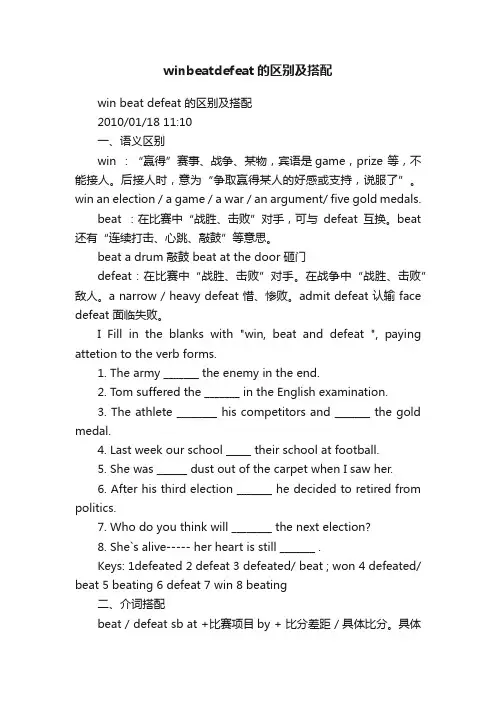
winbeatdefeat的区别及搭配win beat defeat 的区别及搭配2010/01/18 11:10一、语义区别win :“赢得”赛事、战争、某物,宾语是game,prize 等,不能接人。
后接人时,意为“争取赢得某人的好感或支持,说服了”。
win an election / a game / a war / an argument/ five gold medals.beat :在比赛中“战胜、击败”对手,可与defeat互换。
beat 还有“连续打击、心跳、敲鼓”等意思。
beat a drum 敲鼓 beat at the door 砸门defeat:在比赛中“战胜、击败”对手。
在战争中“战胜、击败”敌人。
a narrow / heavy defeat 惜、惨败。
admit defeat 认输 face defeat 面临失败。
I Fill in the blanks with "win, beat and defeat ", paying attetion to the verb forms.1. The army _______ the enemy in the end.2. Tom suffered the _______ in the English examination.3. The athlete ________ his competitors and _______ the gold medal.4. Last week our school _____ their school at football.5. She was ______ dust out of the carpet when I saw her.6. After his third election _______ he decided to retired from politics.7. Who do you think will ________ the next election?8. She`s alive----- her heart is still _______ .Keys: 1defeated 2 defeat 3 defeated/ beat ; won 4 defeated/ beat 5 beating 6 defeat 7 win 8 beating二、介词搭配beat / defeat sb at +比赛项目by + 比分差距 / 具体比分。
16组易混淆动词辨析
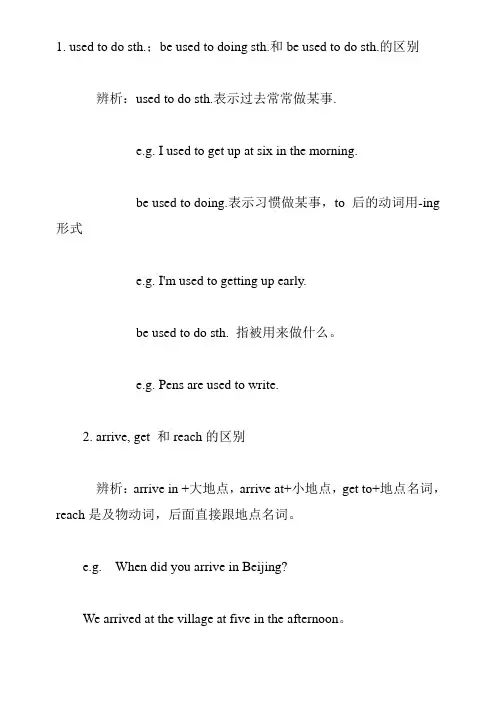
1. used to do sth.;be used to doing sth.和be used to do sth.的区别辨析:used to do sth.表示过去常常做某事.e.g. I used to get up at six in the morning.be used to doing.表示习惯做某事,to 后的动词用-ing 形式e.g. I'm used to getting up early.be used to do sth. 指被用来做什么。
e.g. Pens are used to write.2. arrive, get 和reach的区别辨析:arrive in +大地点,arrive at+小地点,get to+地点名词,reach是及物动词,后面直接跟地点名词。
e.g. When did you arrive in Beijing?We arrived at the village at five in the afternoon。
How do you usually get to school?When she reached the office, the teacher was having a short rest.3. borrow , lend和keep的区别borrow"借",为终止性动词,表示主语"借入"某物,常用短语borrow sth. from sb.lend"借",为终止性动词,表示主语"借出"某物,常用短语lend sth. to sb.keep "保存,借",为持续性动词,表示"长时间地借"e.g. I borrowed a book from the school library yesterday.Could you lend your pen to me?How long can we keep the book?4.dress, put on, 和wear的区别dress sb.给某人穿衣服;dress sb.up打扮某人put on 穿上,戴上,表动作;wear 穿着,戴着,表状态;与"be in"同义e.g. The boy dressed himself quickly.The lady dressed herself up and went to the party.Jim put on his coat and went out.Lily is wearing a red skirt today.5. see, look, watch, readsee 看见,表结果look看,表动作,不及物动词,后面需加介词at才可能跟宾语。
宏图艺考英语百日冲刺第十周知识点
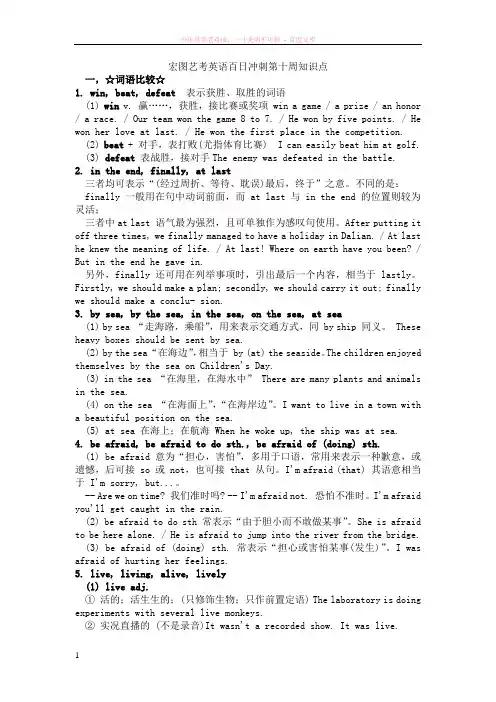
宏图艺考英语百日冲刺第十周知识点一,☆词语比较☆1. win, beat, defeat表示获胜、取胜的词语(1) win v. 赢……,获胜,接比赛或奖项 win a game / a prize / an honor / a race. / Our team won the game 8 to 7. / He won by five points. / He won her love at last. / He won the first place in the competition.(2) beat + 对手,表打败(尤指体育比赛) I can easily beat him at golf.(3) defeat表战胜,接对手The enemy was defeated in the battle.2. in the end, finally, at last三者均可表示“(经过周折、等待、耽误)最后,终于”之意。
不同的是:finally 一般用在句中动词前面,而 at last 与 in the end 的位置则较为灵活;三者中at last 语气最为强烈,且可单独作为感叹句使用。
After putting it off three times, we finally managed to have a holiday in Dalian. / At last he knew the meaning of life. / At last! Where on earth have you been? / But in the end he gave in.另外,finally还可用在列举事项时,引出最后一个内容,相当于lastly。
Firstly, we should make a plan; secondly, we should carry it out; finally we should make a conclu- sion.3. by sea, by the sea, in the sea, on the sea, at sea(1) by sea “走海路,乘船”,用来表示交通方式,同 by ship 同义。
精选谈一谈获胜失败
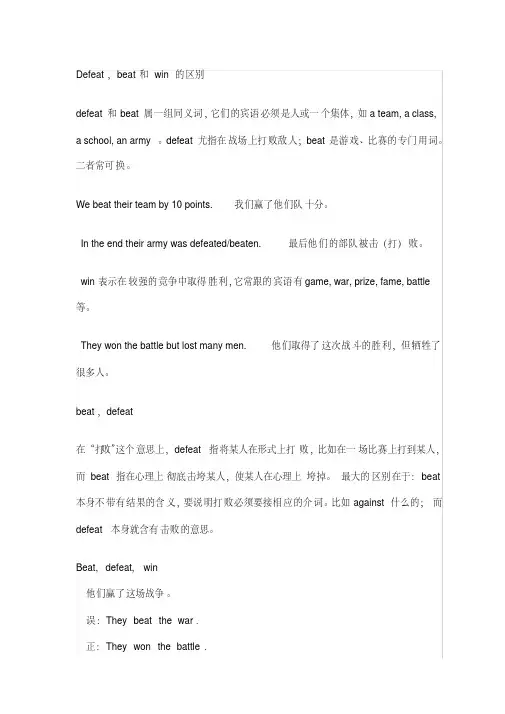
Defeat,beat和win 的区别defeat和beat属一组同义词,它们的宾语必须是人或一个集体,如a team, a class, a school, an army。
defeat尤指在战场上打败敌人;beat是游戏、比赛的专门用词。
二者常可换。
We beat their team by 10 points. 我们赢了他们队十分。
In the end their army was defeated/beaten. 最后他们的部队被击(打)败。
win表示在较强的竞争中取得胜利,它常跟的宾语有game, war, prize, fame, battle 等。
They won the battle but lost many men. 他们取得了这次战斗的胜利,但牺牲了很多人。
beat,defeat在“打败”这个意思上,defeat 指将某人在形式上打败,比如在一场比赛上打到某人,而beat 指在心理上彻底击垮某人,使某人在心理上垮掉。
最大的区别在于:beat 本身不带有结果的含义,要说明打败必须要接相应的介词。
比如against什么的;而defeat 本身就含有击败的意思。
Beat, defeat, win他们赢了这场战争。
误:They beat the war.正:They won the battle.我们打败了他。
误:We won him.正:We beat him in the war.在比赛中我击败了他而赢得奖品。
误:I defeated the contest and won theprize.正:I defeated him in the contest and wonthe prize.解析:win“赢得”,beat“击败”,defeat“打败,胜过”。
win 的用法:win+事、物(作“赢得”解时,宾语不能接人)。
如:He soon won a reputation for himself.beat 的用法:beat+人(作“击败”解时,宾语只能接人)。
中考英语重要词语辨析
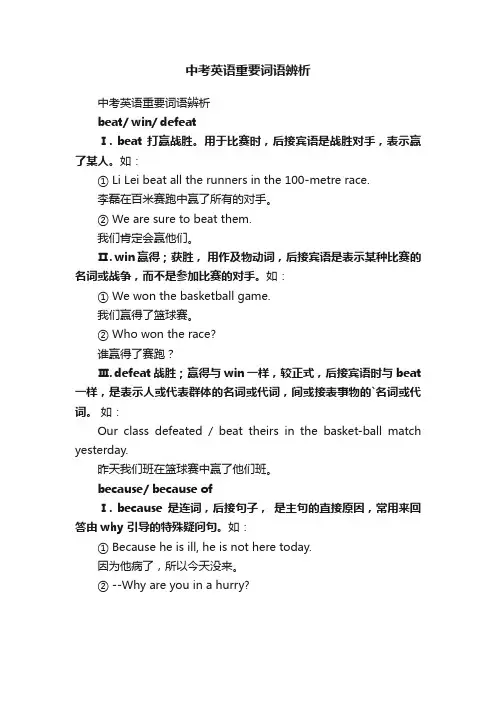
中考英语重要词语辨析
中考英语重要词语辨析
beat/ win/ defeat
Ⅰ. beat 打赢战胜。
用于比赛时,后接宾语是战胜对手,表示赢了某人。
如:
① Li Lei beat all the runners in the 100-metre race.
李磊在百米赛跑中赢了所有的对手。
② We are sure to beat them.
我们肯定会赢他们。
Ⅱ. win 赢得;获胜,用作及物动词,后接宾语是表示某种比赛的名词或战争,而不是参加比赛的对手。
如:
① We won the basketball game.
我们赢得了篮球赛。
② Who won the race?
谁赢得了赛跑?
Ⅲ. defeat 战胜;赢得与win 一样,较正式,后接宾语时与beat 一样,是表示人或代表群体的名词或代词,间或接表事物的`名词或代词。
如:
Our class defeated / beat theirs in the basket-ball match yesterday.
昨天我们班在篮球赛中赢了他们班。
because/ because of
Ⅰ. because 是连词,后接句子,是主句的直接原因,常用来回答由why 引导的特殊疑问句。
如:
① Because he is ill, he is not here today.
因为他病了,所以今天没来。
② --Why are you in a hurry?。
中考英语常考词汇用法
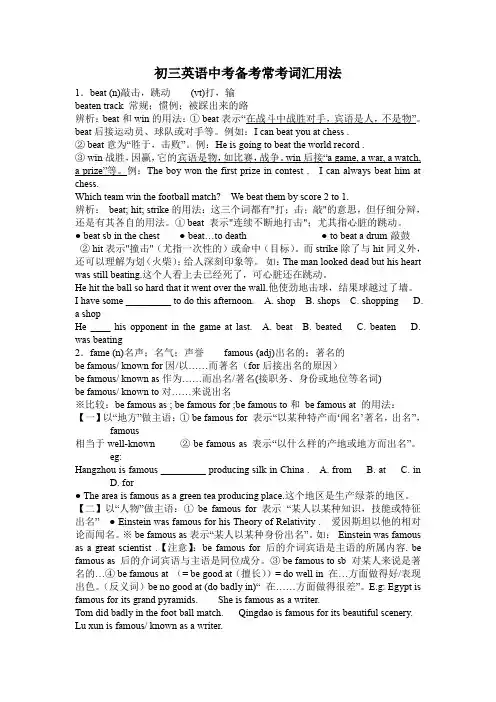
初三英语中考备考常考词汇用法1.beat (n)敲击,跳动(vt)打,输beaten track 常规;惯例;被踩出来的路辨析:beat和win的用法:① beat表示“在战斗中战胜对手,宾语是人,不是物”。
beat后接运动员、球队或对手等。
例如:I can beat you at chess .② beat意为“胜于,击败”。
例:He is going to beat the world record .③ win战胜,因赢,它的宾语是物,如比赛,战争。
win后接“a game, a war, a watch,a prize”等。
例:The boy won the first prize in contest . I can always beat him at chess.Which team win the football match? We beat them by score 2 to 1.辨析:beat; hit; strike的用法:这三个词都有"打;击;敲"的意思,但仔细分辩,还是有其各自的用法。
① beat 表示"连续不断地打击";尤其指心脏的跳动。
● beat sb in the chest ● beat…to death ● to beat a drum敲鼓② hit表示"撞击"(尤指一次性的)或命中(目标)。
而strike除了与hit同义外,还可以理解为划(火柴);给人深刻印象等。
如:The man looked dead but his heart was still beating.这个人看上去已经死了,可心脏还在跳动。
He hit the ball so hard that it went over the wall.他使劲地击球,结果球越过了墙。
I have some _________ to do this afternoon. A. shop B. shops C. shopping D.a shopHe ____ his opponent in the game at last. A. beat B. beated C. beaten D. was beating2.fame (n)名声;名气;声誉famous (adj)出名的;著名的be famous/ known for因/以……而著名(for后接出名的原因)be famous/ known as作为……而出名/著名(接职务、身份或地位等名词)be famous/ known to对……来说出名※比较:be famous as ; be famous for ;be famous to和be famous at 的用法:【一】以“地方”做主语:① be famous for 表示“以某种特产而‘闻名’著名,出名”,famous相当于well-known ② be famous as 表示“以什么样的产地或地方而出名”。
win-beat-defeat-的区别及搭配资料
win beat defeat 的区别及搭配一、语义区别win【短语】win a victory获得胜利/ a game/ a match/the race 比赛获胜/ a prize 获奖the Oscar/获奥斯卡奖/ the war 战争获胜/ praises 获表扬/ a hundred pounds 获得一百镑/ her respect赢得她的尊敬/ his friendship 获得他的友谊win anelection / an argument/ five gold medals.beat :在比赛中“战胜、击败”对手,可与defeat互换。
beat还有连续打击、心跳、敲鼓”等意思beat a drum 敲鼓beat at the door 砸门defeat:在比赛中战胜、击败”对手。
在战争中“战胜、击败”敌人。
a narrow / heavy defeat 惜、惨败。
admit defeat 认输face defeat 面临失败。
I Fill in the blanks with "win, beat and defeat ", paying attetion to the verb forms.1. The army _______ the enemy in the end.2. Tom suffered the in the English examination.3. The athlete _______ his competitors and _______ the gold medal.4. Last week our schooltheir school at football.5. She was _____ dust out of the carpet when I saw her.6. After his third election he decided to retire from politics.7. Who do you think will the next election?8. She's alive— her heart is still ________ .Keys: 1defeated 2 defeat 3 defeated/ beat ; won 4 defeated/ beat 5 beating 6 defeat 7 win 8 beating二、介词搭配beat / defeat sb at +比赛项目by + 比分差距/ 具体比分。
win-beat-defeat-的区别及搭配
win beat defeat 的区别及搭配一、语义区别win【短语】win a victory获得胜利/ a game/ a match/the race比赛获胜/ a prize获奖the Oscar/获奥斯卡奖/ the war战争获胜/ praises 获表扬/ a hundred pounds 获得一百镑/ her respect赢得她的尊敬/ his friendship 获得他的友谊win anelection / an argument/ five gold medals.beat :在比赛中“战胜、击败”对手,可与defeat互换。
beat还有“连续打击、心跳、敲鼓”等意思。
beat a drum 敲鼓beat at the door 砸门defeat:在比赛中“战胜、击败”对手。
在战争中“战胜、击败”敌人。
a narrow / heavy defeat 惜、惨败。
admit defeat 认输face defeat 面临失败。
I Fill in the blanks with "win, beat and defeat ", paying attetion to the verb forms.1. The army _______ the enemy in the end.2. Tom suffered the _______ in the English examination.3. The athlete ________ his competitors and _______ the gold medal.4. Last week our school _____ their school at football.5. She was ______ dust out of the carpet when I saw her.6. After his third election _______ he decided to retire from politics.7. Who do you think will ________ the next election?8. She`s alive----- her heart is still _______ .Keys: 1defeated 2 defeat 3 defeated/ beat ; won 4 defeated/ beat 5 beating 6 defeat 7 win 8 beating二、介词搭配beat / defeat sb at +比赛项目by + 比分差距/ 具体比分。
英语核心词汇详解beat,win,lose
英语核心词汇详解beat,win,lose beat “(在比赛或竞争中)赢,打败(某人)”,后接打败的对手,宾语为人或球队或敌人。
变化不规则为beat-beat-beatenOur Chinese Football Team beat the South African Team last night.昨晚我们中国足球队打败了南非队。
win “赢得(比赛、选举、战争、荣誉、奖项等)”常用于“win sth. (from ...)”结构。
如果后面跟的是sb.,就是赢得了某人的青睐或芳心。
不规则变化: win-won-wonWho won at last?最后谁赢了?I am sure to win the game.我一定能赢得比赛。
lose(1)lose+sth.(game/match/war/prize),意为“输了游戏、比赛、战争或失去奖项等”。
(2)lose to sb. 输给某人Unluckily we lost the match to Class Three.不幸的是我们比赛输给了三班。
What a pity!We lost the game again. 太遗憾了!我们又输了比赛。
一、Miss -小姐,是对未婚女性的常用称呼。
用于姓名的前面或名字的前面,但绝对不可以只用在姓氏的前面:Miss Monica Lenvinsky或Miss Lenvinsky.Miss除了当人称前缀词外,现在还多用于翻译做“老师”,张老师Miss Zhang二、Mrs. -夫人、太太。
对已婚女士的常用称呼,是一个缩略词,S后面加实心小圆点表缩写。
后面一般会跟夫姓。
Mrs. Smith 史密斯太太Mrs. Jones 琼斯太太如果在Mrs. 前面在加上Mr.,则表示夫妇二人的意思Mr. and Mrs. Smith史密斯夫妇三、Ms.-小姐、女士,是对所有女性的称呼,看不出女子的婚姻状况。
是一个缩略词,S后面加实心小圆点表缩写Ms. Keller(凯勒小姐)Ms. Robert 罗伯特女士四、Madame女士,夫人,表示对女性的尊称。
辨析win,beat-配套课件
If you _____ Tom in the chess competition, you can
_____ an award.
A. win; win
B. beat; beat
C. win; beat
D. beat; win
辨析win, beat
win
赢得
race,match,game,war, competition,prize
beat 战胜 loud
比赛、竞争的对手,即指人 或球队的名词或代词
ห้องสมุดไป่ตู้ 知识点讲解
beat
战胜,充当beat的宾语的是比赛、竞争的对手, 即指人或球队的名词或代词。
We beat the strongest team in the football match this time.
知识点讲解 Li Lei beat all the runners in the 100-metre race.
即时练习
用win或beat完成句子。 1. Who do you think will _w__in__ the next competition? 2. The athlete _b_e_a_t_ his competitors and _w_o_n__ the gold
medal. 3. Last week our school __b_ea_t_ their school in football
辨析win, beat
广州华腾教育科技股份有限公司 版权所有
知识点讲解
win
赢得,充当win的宾语的是race,match,game, war, competition,prize之类的词。
- 1、下载文档前请自行甄别文档内容的完整性,平台不提供额外的编辑、内容补充、找答案等附加服务。
- 2、"仅部分预览"的文档,不可在线预览部分如存在完整性等问题,可反馈申请退款(可完整预览的文档不适用该条件!)。
- 3、如文档侵犯您的权益,请联系客服反馈,我们会尽快为您处理(人工客服工作时间:9:00-18:30)。
2019年beat,win与lose的区别 - 大学英语语法大全-word范文模板
本文部分内容来自网络整理,本司不为其真实性负责,如有异议或侵权请及时联系,本司将立即删除!
== 本文为word格式,下载后可方便编辑和修改! == beat,win与lose的区别 - 大学英语语法大全
beat , win 与 lose 的区别: beat (打败),后面跟& ldquo ;人,而 win (赢得),后面跟& ldquo ;比赛、竞赛等
beat , win 与 lose 的区别:
beat (打败),后面跟& ldquo ;人,而 win (赢得),后面跟& ldquo ;比赛、竞赛等。
如: Whowonat last ?(最后谁赢了?)/ Class Threebeatus 5-0.(三班以5∶0打败了我们)/ I am sure towin the match .(我一定能赢得比赛)
而 lose 则表示& ldquo ;输了,常用句型: lose sth . to sb .如:
Unluckily welostthe matchtoClass Three . (不幸的是我们比赛输给了三班)。
